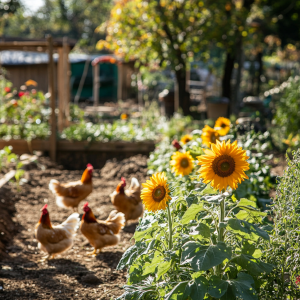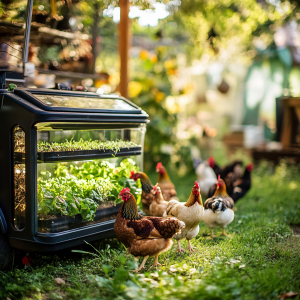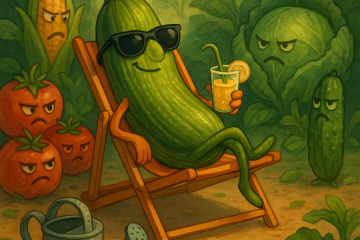
Chickens are so versatile in what they eat
Raising chickens has long been a cornerstone of self-reliant living, but modern times call for modern methods. For those who aim to keep their flocks thriving without relying on commercial feed, innovation and resourcefulness are key. Thankfully, chicken keepers today have developed ingenious ways to provide a balanced diet that’s both sustainable and cost-effective. Let’s explore some of these modern methods that ensure your flock stays happy, healthy, and well-fed.
One of the most exciting approaches is integrating chickens into an aquaponics system. In this closed-loop setup, fish waste fertilizes plants, which in turn provide greens and protein-rich insects for your chickens. The system is highly efficient, allowing for the cultivation of fresh, nutrient-dense food without additional feed expenses. This method also encourages sustainable use of resources and offers a continuous cycle of benefits.
Spent brewery grains are another fantastic feed alternative. Many local breweries are more than happy to give away or sell these byproducts cheaply. Packed with carbohydrates and fiber, spent grains can serve as a hearty supplement to your chickens’ diet. Plus, it’s a great way to reduce waste and build connections with local businesses.
For those with a knack for organization, collecting unsellable but still usable food waste from restaurants or grocery stores can provide a treasure trove of chicken feed. Bruised fruits, veggie scraps, and stale bread—items that would otherwise go to waste—can easily become nutritious treats for your flock. This not only cuts costs but also contributes to a zero-waste lifestyle.
Another modern marvel in chicken keeping is growing duckweed. This small, fast-growing aquatic plant is incredibly high in protein and easy to cultivate. With a simple pond or tank setup, you can produce a steady supply of fresh greens that your chickens will devour. Duckweed is particularly useful for those in urban or suburban areas with limited space for traditional foraging.
Fermented grains have also gained popularity among self-reliant chicken keepers. By soaking grains like wheat, barley, or oats in water for a few days, you can increase their digestibility and nutrient content. Fermented grains are rich in probiotics, promoting better gut health for your flock and making their overall diet more efficient.
Bug farming is yet another innovative solution. Raising mealworms, crickets, or black soldier fly larvae provides a high-protein snack that chickens go crazy for. These systems can be set up in small spaces and require minimal maintenance, making them perfect for chicken keepers who want to ensure their flock has a reliable protein source year-round.
Portable chicken tractors offer an elegant solution for both feeding and protecting your flock. These mobile coops allow chickens to graze on fresh grass and bugs in a controlled area. By moving the tractor daily, you ensure your flock always has access to clean foraging grounds without risking overgrazing.
Sprouted grains and microgreens are another excellent option for providing nutrient-packed food. Simple to grow indoors or outdoors, sprouts and microgreens give your flock a fresh boost of vitamins and minerals, even in the dead of winter. Chickens especially love barley sprouts, which are easy to grow and highly nutritious.

a portable chicken tractor will keep the chickens safe from predators
For those who enjoy DIY projects, homemade feed blocks are a creative way to provide long-lasting snacks. By combining grains, kitchen scraps, and greens into a pressed block, you create a treat that chickens can peck at throughout the day. It’s an easy way to ensure your flock has a steady food source while keeping them entertained.
Finally, permaculture-inspired setups offer a holistic approach to feeding chickens. By planting guilds of chicken-friendly plants like berry bushes, nut trees, and perennial greens near the coop, you create a natural, self-sustaining food source. These systems not only reduce the need for supplemental feeding but also enhance the overall biodiversity of your property.
Each of these methods brings its own set of benefits, but they all share a common goal: to provide chickens with a balanced, sustainable diet while reducing reliance on commercial feed. For the self-reliant enthusiast, these modern approaches offer practical and innovative ways to ensure your flock remains a valuable asset, whether times are good or challenging. By implementing these strategies, you’ll not only save money and resources but also deepen your connection to the land and your flock. After all, self-sufficiency is about more than survival—it’s about thriving with what you have, and there’s nothing more rewarding than a contented, clucking flock to prove it.


